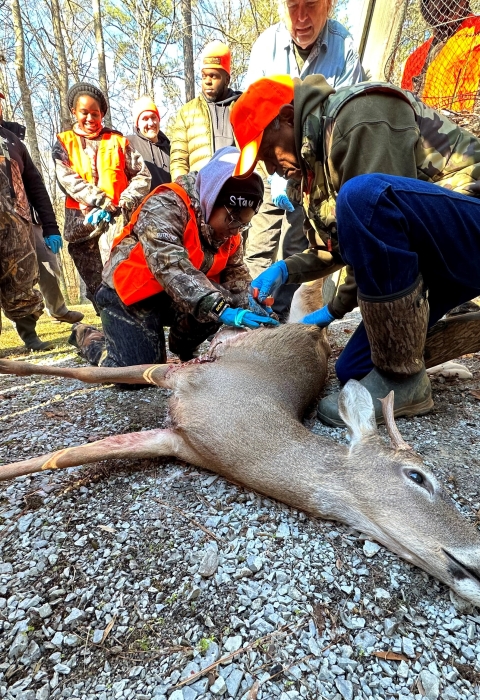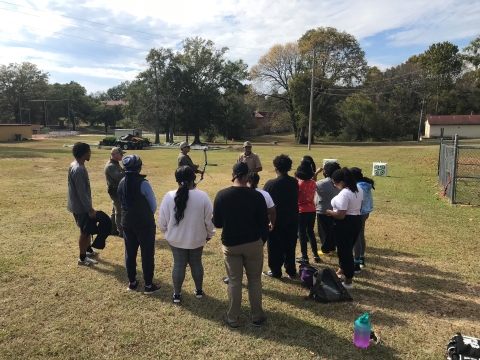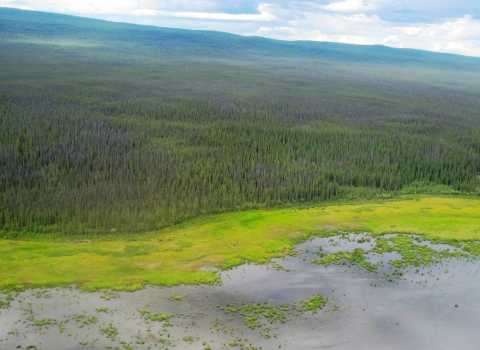Sergeant Bill Freeman and his colleagues at The Alabama Department of Conservation and Natural Resources (ADCNR) are working to ensure the state’s wildlife and wild places are for everyone. These efforts have utilized Wildlife and Sport Fish Restoration Program (WSFR) funds to support hunter education courses and mentored hunting trips for students at Tuskegee University and other colleges in the state.
For Sergeant Freeman the great outdoors is a place to connect and a place to enjoy the natural world, but this connection is not shared by everyone. “Not all communities have had the same access to the outdoors, an introduction to outdoor recreation, or even feel welcome or safe in the space,” said Freeman. With the support of his agency’s leadership, Freeman began looking for a place to build stronger connections between underserved communities and the outdoors in 2015. His first step was to look around his own community. Sergeant Freeman resides near Tuskegee University and decided to reach out to school staff to see if their students would be interested in the state’s hunter education course and learning more about the conservation work of ADCNR.
Every year, over 1 million people receive hunter education that is supported by excise taxes administered through the WSFR’s Hunter Education Program. Alabama and other state fish and wildlife agencies teach these hunter education courses to help students to be safe, responsible, conservation-minded hunters. The first year Freeman offered the course at Tuskegee University about a dozen students enrolled. “Not every student was enrolled because of a direct interest in hunting,” added Freeman. “But hunting had direct connections to many things the students were already interested in including being more comfortable outdoors, eating local, and becoming more self-reliant.”
Once in the course students learned about firearm safety, basic animal biology and habitat needs, and the roles hunters and state agencies play in the stewardship of natural resources. These lessons also helped the students with their courses as some were seeking degrees in biology or animal, poultry, and veterinary sciences. However, the course did attract students from many different academic programs at the university. Today, the university has made hunter education a required part of a student’s curriculum for certain majors. Justin Grider, R3 Coordinator at ADCNR, explains that the program success is due in large part to Freeman’s ability to build partnerships. “A lot of the credit goes to Bill, his passion for conservation and teaching makes the outdoors more accessible and welcoming for students,” said Grider.
Building on the success at Tuskegee, Freeman expanded to other Alabama universities like Auburn and Alabama A&M. “Using hunter education for university students is a great way to get students involved in outdoor recreation,” explains Freeman. “The curriculum is already available and is presented to give students the tools and knowledge needed to get outdoors while being safe and conservation focused.” After 8 years, the outreach efforts that started at Tuskegee have grown to include dozens of students, multiple universities, mentor led hunts to help students put their hunter education course knowledge into practice, a four-day summer camp, and introductions to ADCNR staff. Freeman and his fellow ADCNR staff have hosted these hunter education students on ride alongs to see conservation in action and explore how state agencies manage a resource for the benefit of the public. Other students have taken it a step further and decided to join the agency as interns and work on a variety of stewardship projects in Alabama.
As outreach efforts to help college students hunt and get outdoors continue throughout the state, Alabama has regulations in place that allow out of state college students to pay resident prices for hunting and fishing licenses. “There have been hundreds of students that have taken advantage of this program and we are continuing to streamline the process to welcome college students aged 17-23 to get outdoors hunting and fishing in Alabama,” added Grider.
Alabama has tremendous natural diversity containing more than 1.3 million acres of public hunting land with hunting opportunities for white-tailed deer, wild turkey, quail, feral hogs, doves, waterfowl, and many other species. Hunting and other outdoor related activities allow the public to enjoy the state’s resources and become an active member in the stewardship of these resources. Freeman plans to continue his work to connect college students and others to outdoor recreation and conservation through hunter education in Alabama. To learn about hunting safety in Alabama visit www.outdooralabama.com/hunting/hunter-education-alabama or visit Adult Mentored Hunting Program | Outdoor Alabama to learn more about the mentor hunting program.






